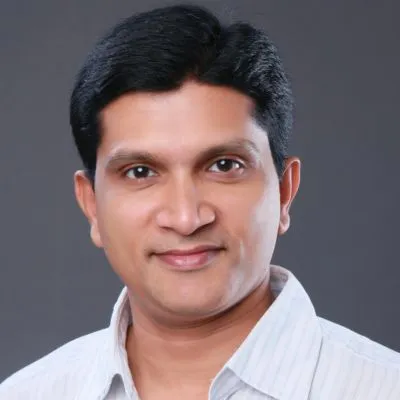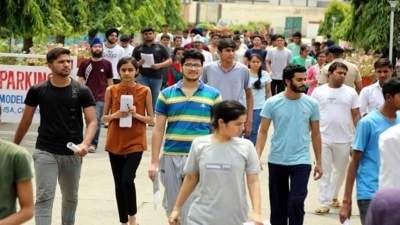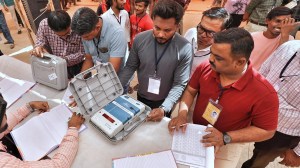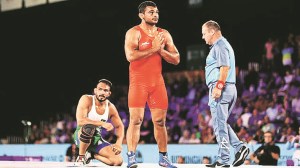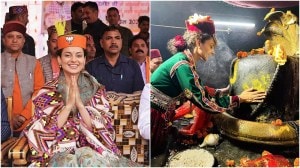- India
- International
Justice Arun Mishra retires today, leaving contested SC legacy
For critics, from the bench to the Bar, experts to courtwatchers, he became emblematic of a court that has diluted its check-and-balance role when it comes to questioning the Executive. His supporters, however, argue that much of this criticism has a political motive — and his record is more nuanced.
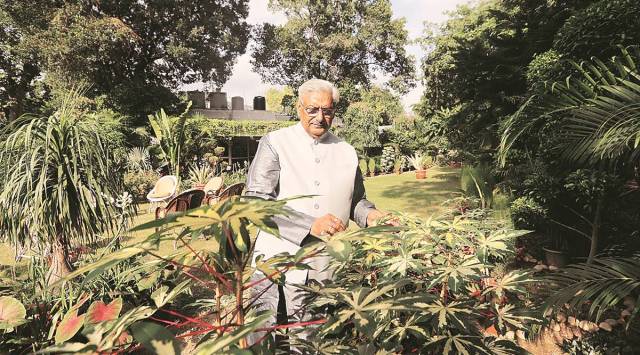 At home on Tuesday. After his praise for PM set off criticism, he told a senior counsel: “Do you want to hear something good about yourself? But I will be criticised”. (Express Photo by Tashi Tobgyal)
At home on Tuesday. After his praise for PM set off criticism, he told a senior counsel: “Do you want to hear something good about yourself? But I will be criticised”. (Express Photo by Tashi Tobgyal)Perhaps no Supreme Court judge has in recent times been the subject of as much debate — even disquiet — in his tenure as Justice Arun Mishra.
For critics, from the bench to the Bar, experts to courtwatchers, he became emblematic of a court that has diluted its check-and-balance role when it comes to questioning the Executive. His supporters, however, argue that much of this criticism has a political motive — and his record is more nuanced.
Since he took over as SC judge in July 2014 — after a stint in Madhya Pradesh and as Chief Justice in Rajasthan and Calcutta — Justice Mishra heard some of the most contested and politically sensitive cases: the Sahara-Birla diaries to the Haren Pandya murder; the medical college bribery case to amendments to Scheduled Castes and Scheduled Tribes (Prevention of Atrocities Act); the mess in the CBI at the top; anticipatory bail pleas of activists in the Bhima Koregaon case; and the land acquisition matter in which he headed the bench to review a ruling he himself was part of.
In most of these cases where the government was involved, his critics say, Justice Mishra’s bench gave it the benefit of the doubt.
In January 2017, a bench of Justices Amitava Roy and Mishra dismissed NGO Common Cause plea for a probe into the Sahara-Birla diaries which the petitioner claimed indicated alleged payments to top party functionaries across the political spectrum.

Nothing drew attention to him as strongly as the unprecedented January 2018 press conference by four most senior judges of the court Justices Ranjan Gogoi, J Chelameswar, Kurian Joseph and Madan B Lokur (all since retired). The judges aired concerns on the allocation of important cases by then Chief Justice Dipak Misra to “junior judges”.
Justice Chelameswar said they met the CJI in regard to listing of a case, but could not convince him. Pressed for details, Justice Gogoi said: “It is an issue of an assignment of a case which is an issue raised in court”.
Asked if it was about the petitions seeking a probe into the death of special CBI judge B H Loya, Justice Gogoi replied in the affirmative.
The Loya case was initially assigned to a bench headed by Justice Mishra but following the controversy, was heard by a bench headed by the CJI himself.
However, at a public interaction with journalist Karan Thapar in April 2018, Justice Chelameswar was guarded.
Thapar told him many believe that the trigger for the press conference was the meeting between the four judges and the CJI that morning where they reportedly took up the question of “inappropriate” allocation of the Loya petition.
To this, Justice Chelameswar replied they had not said that “allocation of case was inappropriate”.
“What transpired that morning was never mentioned in the press conference. Lot of things transpired but then it was a joint press conference,” he added.
“The Loya case was listed that day. So people started drawing inferences,” said Justice Chelameswar. Asked if the inference was wrong, he replied: “I’m not saying anything.”
While there may still be no clear answer on whether the Loya case was a point of dispute, sources have told The Indian Express that there were differences over the allocation of a case related to 2013 Land Acquisition Act to a Bench comprising Justice Mishra.
Two of the judges who attended the press conference — Justices Joseph and Lokur — were part of a three-judge Bench ruling in 2014 which held that that merely depositing the compensation in the Treasury cannot be treated as compensation paid to land owner and the acquisition could be cancelled on this ground.
In February 2018, a bench of Justices Mishra and two others took a different stand and held in a 2:1 ruling that compensation not availed of within a stipulated five-year period could not be ground for cancellation of land acquisition.
The matter was eventually referred to a five-judge Constitution bench headed by Justice Mishra himself. Though some parties demanded he recuse, Justice Mishra refused.
“Is this not maligning the court? If you had left it to me, I would have decided…But you are taking to social media to malign me…and the Chief Justice of India…Tell me one judge who has not taken a view on this. Will that mean all of us are disqualified?” Justice Mishra asked the counsel who sought his recusal. In one hearing, his outburst provoked a walk-out by an advocate. In March 2020, the Constitution bench went on to agree with the 2018 ruling.
In December 2017, when the medical college bribery case set off difficult days for the then CJI Dipak Misra, the plea seeking probe was dealt with and dismissed by the Justice Mishra Bench. The storm over the case had led to a heated debate over the power of the CJI to allocate cases as “master of the roster.”
Justice Mishra was also part of the bench constituted when allegations of sexual misconduct were raised against former Chief Justice Ranjan Gogoi.
Later, another bench headed by him heard a related matter which pointed to a conspiracy to malign CJI Gogoi and alleged irregularities in the SC Registry.
In July 2019, a two-judge Bench led by him restored the conviction and sentence imposed on nine of the 12 accused in the March 2003 murder of former Gujarat Home Minister Haren Pandya. The Gujarat HC had acquitted them of murder charges in the politically sensitive case that saw trouble for the ruling BJP in the state.
In early 2019, when a tussle ensued in the CBI and the government appointed IPS Officer M Nageswara Rao as interim director, it was again Justice Mishra-led bench which heard and dismissed petitions challenging this.
In a case where he felt that the petitioners were trying to “influence” him by fielding a familiar face, Justice Mishra was livid: “I know why they have come to you…Maybe they thought about Calcutta…But it’s not going to work”, he said as Kalyan Banerjee — Senior Advocate of the Calcutta High Court where he was Chief Justice before coming to the SC — appeared for some flat owners in a case where the bench had ordered demolition of illegal apartment complexes in Kerala.
The bench stuck to its demolition order and saw to it that it was implemented.
Justice Mishra has been nonchalant amidst all the criticism and avoided public reactions. He, however, dropped enough hints during hearings.
In some hearings after the 2018 press conference, Justice Mishra would ask lawyers why they were crowding in a “junior Judge’s” court.
In February this year, while speaking at an SC-organised event, Justice Mishra called Prime Minister Narendra Modi a “versatile genius” setting off sharp criticism from the Bar.
During a hearing soon after that, he asked a Senior counsel: “Do you want to hear something good about yourself? But I will be criticised”.
Those close to him say that one of the cases Justice Mishra singles out as “satisfying” is when he restrained the Haryana Government for changes in the law allowing construction on the eco-sensitive Aravalli hills. And in November 2019, when smog choked the National Capital Region, he headed a Bench that stepped in and called for timebound action.
Hearing the criminal contempt case against advocate Prashant Bhushan, his bench convicted him for two tweets calling them as a threat to the fundamental pillar of democracy. After Bhushan refused to apologise and stood firm, Justice Mishra remarked that judges, when attacked, cannot run to the media to defend themselves and can only speak through their judgments.
Now that he leaves the bench, perhaps like many of his brother judges who have retired, he may even break a silence or two.
Apr 18: Latest News
- 01
- 02
- 03
- 04
- 05











